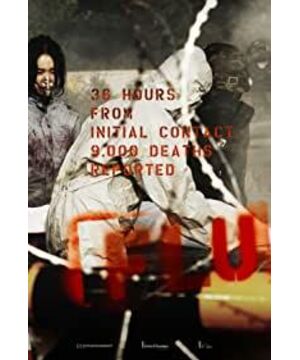Needless to say, this is an atypical Korean disaster film. The film has a large amount of information and has the charm of a Hollywood blockbuster, but the penetration at all levels and the processing of some links are slightly green.
The film continues the style of idol dramas, using handsome guys and beauties as the protagonists. The smuggling plot at the beginning gives an ominous premonition, and the atmosphere rendering is relatively successful. After the main film begins, the rivalry between the male and female protagonists slows down the film rhythm significantly, and the plot of the "snake head", the survivors, and the protagonist plot are not integrated, and layers appear.
The male protagonist is a simple, honest and resolute individual heroic image, while the female protagonist continues the image of the mother under the conflicting plots in the idol drama.
The role of the little girl in the film is accurate and her performance is successful, which not only increases her acting points, but also increases her emotional points. In comparison, the emotional scenes between the male and female protagonists are procrastinated and redundant.
The male protagonist is also a typical humorous supporting actor in idol dramas. The setting of this character in the film is more reasonable, which injects a fresh breath into this disaster film.
The appearance of the president is another highlight of the film. The character has a distinct personality, not only has the calm and calm politician's demeanor, but also does not lose the courageous and heroic temperament of the people. The role elevates the film while also impressing the audience.
There are a few details worth noting:
"Snake Head" opened the container to see the corpses scattered all over the place, and the male protagonist broke into the restricted area and saw a horrible mass grave. These two scenes echo each other from a distance, and it can be seen that the director has ideas and routines in the layout.
Obedience is the duty of a soldier. The machine gunner used an early warning strafing when he was continuously ordered to fire. A row of craters on the ground made the audience's heart hang in the air, and this kind of early-warning shooting from far to near has won precious time for life, which is also the ultimate machine gunner can do as a soldier. This small link reflects the careful thought of the director.
The take-off of the U.S. fighter jet and the appearance of the South Korean surface-to-air missiles only took a few seconds, but they pushed the film to a climax in an instant. This is enough to see the power of the director's lens.
One thing needs to be said. Some viewers think that the performances of Korean actors are exaggerated and overdone, and I personally think that is not the case. The landlord is from Jilin, and he still understands this issue relatively well.
You must know that they are from the Korean ethnic group, not the Han ethnic group. They speak Korean, not Chinese. Whether it is the Korean people in the south, north or Jilin, their language has long and glide sounds, and their facial expressions are rich when they speak. Just like Indians like to shrug their shoulders and tilt their heads and use gestures when speaking, it is a matter of national habits, not entirely a matter of performance.
Chung Tie: It's thought-provoking, the drama in the drama makes people tearful, and the
emotional drama has always been the strength of Korean movies, and this film is also a movie full of emotional drama.
When the little girl faced the gun and blocked her mother; when Soldier A took off her mask and knelt in front of her mother's wheelchair, how many spectators shed tears?
This is affection.
When the male protagonist faced the dilemma between the mother and daughter and more people who needed rescue, the male protagonist's colleague appeared and broke down the fence in place of the male protagonist, so that the male protagonist could concentrate on protecting the mother and daughter.
This is friendship.
When the male protagonist learned that the female protagonist had a history of marriage and had children, he did not give up; when the mother and daughter faced death threats, the male protagonist stepped forward and sacrificed his life to protect the mother and daughter. This death-tested emotion goes beyond ordinary friendship.
This is love.
No matter the hero, heroine, survivor, president, congressman, US representative, military officer, everyone has problems and mistakes, but everyone has difficulties. There is no adult in this film who is absolutely positive or negative, which is also a major feature of the film.
I want to focus on the role of the president.
The plague is prevalent and there are countless casualties, and the Blue House is facing an unprecedented crisis. Under pressure from the White House's hard-line approach, lawmakers gave in when the situation reached a point of near despair. They decided to abandon the patients and execute them all. At the critical moment, it was the president who stepped forward to turn the tide, ignoring pressure from all parties, and saving thousands of lives. Whether this move is correct or not, at least the audience can be excited and applauded.
Then the president will be on fire afterwards, right? The support rate will definitely skyrocket, right?
Those who know are self-evident, and those who do not know say you may not believe it. There is nothing to sing about, there is no commendation meeting, there is not a large number of heroes who have emerged in the face of the disaster, and there is no report that "the people in the disaster area are currently emotionally stable". And the president must step down.
On the public side: Although the constitutions of some countries provide for force majeure exemption clauses, the public does not buy it. Whatever the cause, the length of the process, or the outcome, the president's decline is a foregone conclusion.
In terms of the ruling party: In order to ensure the ruling status, the ruling party will follow international practice and adopt the method of "throwing a pawn car" to let the president resign to quell the situation.
From the White House: The special situation on the peninsula makes South Korea an important part of the US strategic deployment in the Far East. The U.S.-South Korea alliance is a general direction and cannot be destroyed. Anything under this general direction is a trivial matter. The actions of the South Korean president have touched the bottom line of the US-ROK alliance, and the pressure from the other side of the ocean will continue and cannot be ignored.
As for the opposition parties, needless to say, they are already drafting a no-confidence motion before they can even eat dinner.
This is the movie's most thought-provoking scene.
Xiajie: Goguryeo breaks through the old ways and Smecta writes a new chapter When
Westerners mention Asian movies, the first thing that comes to mind is Japan and India. In the past ten years, Thai and Korean films have developed vigorously, and they have a tendency to catch up with the former. While good films in Thailand are mainly focused on ghost and horror films, Korean films are well-rounded.
Romance films and idol dramas have always been the representatives of Korean film and television. Beautiful pictures, slow plots, bumpy love roads, handsome guys and beauties all left a deep impression on people. Korean filmmakers see their own shortcomings and limitations. They continue to broaden their thinking, learn from classics, seek breakthroughs, and improve themselves. High-quality movies are popping up like mushrooms after a spring rain.
From "Old Boy" to "Masquerade", from "Unforgivable" to "Montage", Korean revenge films are heart-wrenching.
From "Common Security Zone" to "Memories of Murder", from "Seven Days" to "Blind Witness", South Korean suspense films are full of splendor.
From "Invasion of Iron Worms" to "Skyscrapers", from "Horror Live" to "Influenza", Korean disaster films are thrilling.
From "Rose and Red Lotus" to "Death Exam", from "Seeing the Devil" to "The Beginning and End of the Kim Funan Murder", Korean horror films are bloody.
Different people will have different reactions to seeing the rise of Korean movies, which involves the question of whether a movie has national boundaries.
It should be said that film has neither borders nor borders.
Personally, I don’t think we should wear tinted glasses to look at Korean movies. I think that the movies on the stick have a kimchi smell and are not worth watching. This will only make our movie-watching journey miss a beautiful scenery. And those movie fans who do a 360-degree backflip naked in the ice and snow don't need to be extreme, Korean movies are not good enough to make fans worship. As long as it is a movie that I personally think is good, it should be affirmed, and there is no need to love Wujiwu for a movie that I think is not good.
In this sense, cinema has no borders.
As for the comparison of film quality between China and South Korea, I secretly think that this is a false proposition in itself. A small-scale comparison of a shot, a plot, or the like is okay, but any overall comparison is unconvincing. Different environments, different backgrounds, different cultures, different systems, different pursuit directions, different audiences... Do we need to bypass so many differences and look for similarities in race when watching a movie Does it force a comparison?
Maybe a Korean director will say: Give me a billion people and I can lead Asia; maybe a Chinese director will say: Kill me and I can dominate the world. But this is neither credible nor realistic. No one intends to compare in too many differences, and no one intends to find truth in too many assumptions.
In this sense, cinema also has borders.
I will not reject Korean sci-fi films, that kind of challenge can set an example for us;
I will not reject Korean Korean films, which also make us dream about the strait;
I will not reject Korean life films, That uninhibited part no longer makes us pretentious;
I will not reject Korean legal movies, and that ringworm drift should make us feel so bad...
Korean movies, we are looking forward to you now.
Korean movies, we will surpass you in the end.
View more about Flu reviews











